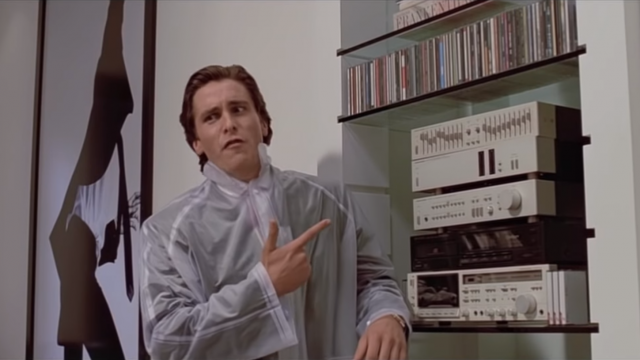This movie is, famously, about the emptiness, excess, and shallow materialism of 80’s yuppie culture, and yet, when I watched it for the first time in 2009, I found it strangely resonant with my feelings at the time towards geek culture. I could recognise Patrick Bateman’s simultaneous obsession with the surface details of his chosen lifestyle and utter repulsion by its lack of any real meaning, as well as his inability to reconcile those two feelings. When Patrick looked over Paul Allen’s business card with envy, I could laugh at the absurdity (“My god, it even has a watermark!”) while getting what drove his maddening fascination with it, because I could see how it was simply my own pop culture obsession played out in some absurd context. Patrick is an addict – not just to cocaine or any number of prescriptions drugs, but to sensation itself, gleefully absorbing the clothing and food and sex and, uh, drugs he’s surrounded by, but he’s no Paterson; he finds those sensations fleeting and empty, forcing him to chase higher and higher highs at the expense of falling apart internally. This is why it doesn’t matter if his murders are ‘real’ or in his head; they’re the next logical extension of a sensation to fulfill him. What makes Patrick interesting as an individual is a raw intelligence that he uses to divine and refine the underlying meaning behind the objects he surrounds himself with – to create a perfect workout and skincare routine, and to deconstruct his favourite albums and songs – and an inability to actualise that into meaningful happiness and an ability to make others empathise with him – indeed, he openly tells us that he believes being empathised with is impossible.
American Psycho is a work of literature, a breakdown of the psychology and viewpoint of one particular individual; for it to last, it has to capture psychology that continues to play out in different contexts across time. Patrick Bateman is an extraordinary expression of an ordinary feeling that people in the 1980’s felt; I’ve never actually read the original novel, so when I looked it up I found that it was published in 1991, making it another work that captured the pure essence of a time by coming out shortly after that time was over and it could be fully processed. Bret Easton Ellis buried his work in details he lifted from the world around him (and, indeed, was clever enough to bury it in clownishly mismatched details for shits and giggles, I’m told); Mary Harron and her crew followed suit, creating a scathing commentary on a time long since passed. Making fun of idiots and assholes in the present can serve a specific purpose – catharsis, if nothing else – but once that moment passes, a story needs to have explored a more universal idea in order to be relevant. In the case of American Psycho, there will always be people enthusiastically embracing the details of a culture but unable to square them into a way to actually relate to others; when I watched it in ’09, I could mentally swap out the details of the Eighties for details related to geek culture and see the way Patrick’s situation was a metaphor for my own. I can see some eighteen-year-old cottagecore moodboard femboy thigh-high socks leftist who fully believes in the spirit of the language that culture has developed and is frustrated by their inability to connect to others sitting down to watch this film and seeing the metaphor, and I like that. I like that American Psycho can knock down the arrogant and despairing notion that our suffering is unique and that we are anything other than the latest iteration of a long line of human beings.

